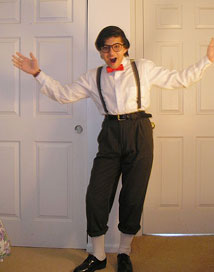When is a Dictionary Useful?
To Confirm Meaning
A dictionary works best when you already have some idea of a word’s meaning based on context clues or word parts. When you look up a word, read all the definitions so you can decide which of your reasonable guesses makes the best sense in the passage you’re reading.
Let’s think through an example using the word “tangentially” from Bill Bryson’s essay “So Sue Me.”
Allied with the idea that lawsuits are a quick way to a fortune, whether deserved or not, is the interesting and uniquely American notion that no matter what happens, someone else must be responsible. So if, say, you smoke eighty cigarettes a day for fifty years and eventually get cancer, then it must be everyone else’s fault but your own, and you sue not only the manufacturer of your cigarettes, but the wholesaler, the retailer, and so on. One of the most extraordinary features of the American legal system is that it allows plaintiffs to sue people and enterprises only tangentially connected to the alleged complaint.
Bryson provides a rich context for tangentially. In the sentence before the word, the author writes that attorneys of smokers sue cigarette wholesalers and retailers. Clerks at convenience stores don’t seem directly responsible for someone’s lung cancer so tangentially must mean “indirectly connected.” When I look up tangentially in the dictionary, I find out that it means “incidentally” or “of little relevance.” That confirms what I thought.
To Confirm Pronunciation
Because regional dialects vary, the pecan, a nut used in our Thanksgiving pie, can be pronounced three different ways:
- Pecan can rhyme with “on”: pi-ˈkän.
- Pecan can rhyme with “an”: pi -ˈkan.
- Pecan can be pronounced with the emphasis on the first syllable and rhyme with “an”: ˈpē-ˌkan.
We may pronounce this one nut several different ways, but for most words, we have less freedom. That’s where the audio files of an online dictionary come in. If you have an appointment with the ophthalmologist during school, don’t tell friends that you “excaped.” The word is “escaped.” When you return to school, don’t tell the other pupils that the eye doctor “dialated” your pupils. Say that your pupils were “dilated.”
If you were older and in the market for a house, you’d go to a realtor. Say the word realtor aloud. What is the correct pronunciation of the word? Write the answer in your notes. When you’re finished, check your understanding.
The first syllable rhymes with “feel,” the second with “fur.”
CloseClick here to use Merriam-Webster.com to listen to the correct pronunciation.
Imagine that you’d like to buy that property in an archipelago. How would you pronounce the word archipelago? What is the correct pronunciation of the word? Write the answer in your notes. When you’re finished, check your understanding.
“ark”
CloseClick here to use Merriam-Webster.com to listen to the correct pronunciation.
Now you need to furnish the house in that archipelago. You want a matched set of furniture, so you ask for a suite. How do you pronounce suite? Does it sound like a set of clothes or like candy? What is the correct pronunciation of the word? Write the answer in your notes. When you’re finished, check your understanding.
“sweet,” as in “that candy was almost too sweet”
CloseClick here to use Merriam-Webster.com to listen to the correct pronunciation.
For commonly mispronounced words, see http://www.yourdictionary.com/library/mispron.html.
To Learn Etymology

Source: Self-portrait as stereotypical nerd,
Paul Ittoop, Wikimedia Commons
Dictionaries are also useful for learning about the etymology of a word. Tracing the origin of a word can make for interesting detective work. Take the word “nerd.” Dr. Seuss probably coined this word in his 1950 book If I Ran the Zoo. Seuss’ narrator Gerald McGrew wanted to add a “nerkle and a nerd” to his imaginary zoo collection.
To Learn Popular Words
Dictionaries are also useful when you want to impress people. It’s cool to know the top ten songs, recording artists, comedians, colleges, so why not know the top ten words? Review the most frequently looked up words in Merriam-Webster. You'll find the Top 10 Most Frequently Searched Words on M-W.com in the center of the webpage.
Some of these words—like the four-syllable word ubiquitous—just sound smart. Others—like affect and effect—are commonly looked up because people mix them up.
Use your notes to answer these questions. When you’re finished, check your understanding.
- From this list of top ten most frequently searched words, what word would you like people to use to describe you?
- From this same list of ten, what word would you not want used to describe you?
Sample Response:
- You are a person of integrity.
- You are pretentious, apathetic, cynical, and ambiguous.